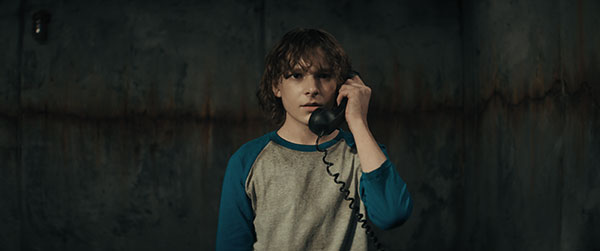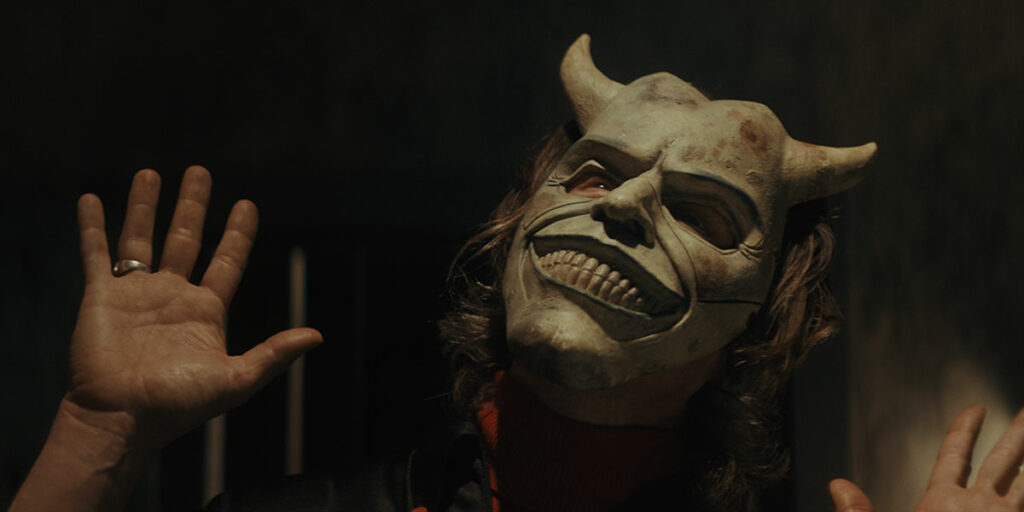The Black Phone is a disappointment; what was marketed as a stripped-down and claustrophobic horror film ends up with ghostly apparitions and IT-esque residue.
Box office-hit film IT and acclaimed Netflix series Stranger Things changed the horror landscape for general audiences. Although that may be for better or worse, one can’t deny that more directors are crafting palpable chillers for broader and younger audiences. This might cause them to, later on, begin to see the classics from the 70s and 80s, like A Nightmare on Elm Street (which ST’s latest season takes many inspirations from), Halloween, Jaws, and Friday the 13th. The newest film to come from this selection is Scott Derrickson’s latest feature, The Black Phone, adapted from Joe Hill’s story. However, in this case, that comes to a fault as its horror depictions, and dark themes of abuse and addiction aren’t explored to an expansive degree. The Black Phone begins with a quick baseball game, showing only the last inning with one last out for the pitcher to take out. It doesn’t go well for the film’s main character, shy yet clever thirteen-year-old Finney Shaw (Mason Thames), as the opposing team scores a homerun.
Once the game ends, a needle drop of Edgar Winter’s ‘Free Ride’ appears, and it’s too on the nose, as we slowly see the home run hero of said game, Bruce (Tristan Pravong), being followed by a black van. We don’t know what happened to him, but one might think the driver kidnapped him. The film later transitions into some found footage-esque scratchy vintage reels of a bandana with blood in it, black balloons floating in the air, kids with cuts on their faces and knees, and several posters of missing kids. This short segment causes a sense of unease, but that sensation is quickly shot down once the IT-like story trappings begin to arrive. The film even brings the bright yellow raincoat and red boots to the mix. Unfortunately, the movie started to lose me because of it. The problem with that structure and horror aesthetic is that it isn’t particularly scary. But, of course, it has some positive sides.
The group of kids (aka. The Losers club) are likable. They deliver good performances, as well as a combination of practical and visual effects to provide some punch to the horror set-pieces. However, the film doesn’t contain the right amount of tension and thrill for the most part. About twenty-five minutes into The Black Phone, we see our first glimpse of Ethan Hawke’s The Grabber, a sadistic kidnapper and killer who traps kids in a soundproof basement and wears a white mask with deviled horns. It’s a great mask, to be completely honest, especially the one with the big smile: it’s absolutely astonishing. That mask perfectly fits Hawke’s performance and his character’s demeanor. The Grabber is friendly-ish, in a sadistic way, yet cold-hearted, and Hawke does his best to capture both sides with his performance, even if he isn’t given much to work with. And now, thinking of it, Hawke basically plays a different version of Bughuul, the main antagonist from Derrickson’s Sinister, with the only difference that, here, he’s grounded to reality, as he isn’t a Pagan deity. The Grabber tries to befriend Finney to ensure he’s on his “good side”.

He promises he won’t hurt him, but we all know that won’t be true. To quote Al Pacino’s Michael Corleone in The Godfather Part III: “Just when I thought I was out, they pull me back in.” The viewer is now presented with signs of both light and dark with the characters of Finney and The Grabber – a moral dilemma between the two – that engages the viewer and sets up the correct number of thrills for the forthcoming horror set-pieces. One starts to think about movies like Fincher’s Panic Room, Silent House (even if it is narratively lacking), and Don’t Breathe. However, there’s a back and forth between being engaged and not because, moments later, the narrative adds a mythical element of talking to the ghosts of the lost children (the killer’s previous victims) and Finney’s sister, Gwen (Madeleine McGraw), has dreams about the kidnappings. In my opinion, that aspect doesn’t fit well with its stripped-down and claustrophobic atmosphere. And again, this is due to IT and Stranger Things’ reconstruction of PG-13 horror pictures.
Instead of having Finney slowly figure out how to get out of that basement, the kid’s ghosts help him with the dirty work. One does not expect to see some of Robert Bresson’s masterfully crafted A Man Escaped-type constructions to Finney’s escape. Still, at least it would have been relatively more interesting to see a stripped-down version of The Black Phone’s premise. We continually see vintage footage of various kidnapped kids. Although the initial footage is thrilling and captivating, it tends to get annoying quickly because it doesn’t add much to the narrative (only exposition) or its themes. In between scenes of “tension” and “drama”, it adds ones of comedy (James Ransones’ cocaine scene, mainly), which might have worked in the hands of other directors, but not Derrickson’s. In addition, there’s this loss of direction between the transitions of said scenes. There’s a sense of backing away from specific topics once they are brought up.
The horrors of abuse and addiction Finney’s father is going through aren’t explored in the least. It is shown in several scenes, including one where he beats his daughter with a belt, and she later drops a bottle of vodka to the floor. Albeit, after a couple of seconds, Derrickson switches gears and adds comedic elements to entertain the audience instead of keeping a serious tone. It is disappointing seeing a horror film with intriguing initial concepts continue doubling down on ideas that don’t work in full. The Black Phone’s last couple of minutes are of sheer brutality and pure violence, which doesn’t add up, as we never saw Finney’s character arc lead up to such forceful ratios. Those moments feel forced onto the character, as if the director and screenwriter didn’t know where to end the movie. It leaves much to be desired to some proportions, because you see the basement movie concoctions, like the handcrafted traps, but in others, it doesn’t fit the tone being presented at all. It reminds me of two quotes from the film’s first couple of minutes, where the school fighter says: “The more blood, the better. For the crowd, you know? It makes a stronger point.”
What is Derrickson trying to say here exactly? Because, in the end, those are the quotes Finney takes into his heart when the film reaches its climax. I know Derrickson didn’t mean to say that violence resolves all problems, but what does it all refer to? Either I must have missed something, or the director forgot to develop one of its core ideas. After Finney has suffered that traumatic experience and finally gets out, everything that has happened in his life is fixed, like an ending to a fairytale – happily ever after. Every problem he had throughout his life, such as bullies, the relationship with his abusive and drunk father, and having just done an extremely violent act, is resolved immediately. Again, there’s probably a good intention and heart to tell Joe Hill’s story since Derrickson mentioned in the premiere screening at Fantastic Fest that the film “is all about family.” If it is “all about family”, it seems quite peculiar to have moments of sheer brutality arriving out of thin air that doesn’t add any exploration towards any of the themes thrown at the table.
These types of situations scar a kid completely, and in The Black Phone, we don’t see a glimpse of change in his persona. It feels careless and without a thematic aim, and if the purpose was to put all of that to the side and focus on the basement-movie elements, they are poorly done. Not only does it have Stranger Things residue, but, unfortunately, it also has crumbs of Stephen King’s poorer works. Although I have several problems with it, some positive elements help get the viewer through the movie’s 102-minute runtime. Mason Thames and Ethan Hawke’s performances are pretty strong compared to the material given. The best scenes are when they are together on-screen, and even if there aren’t enough of them as one might like: those are the ones that stick with you in the end.
I can see why people would get scared by The Black Phone – the exact reasons why people were frightened by Paranormal Activity and Sinister. Putting aside my reservations about both features, the “quiet, quiet, quiet… BANG” scenarios, and spritzy jump scares might catch people off-guard. However, I think they are forged better in those pictures than in this one. And adding insult to injury, the film’s first trailer literally spoiled the entire movie’s premise and narrative. So, if a person watches it, there is little to no thrill to experience or explore because there’s nothing else left to seek out. To this day, Scott Derrickson hasn’t surpassed his sophomore feature, The Exorcism of Emily Rose. For whatever reason at fault that might be, there’s still promise at the bottom of the end credits. If he took a stripped-down approach to filmmaking, I believe he could find a way to deliver some well-crafted horror features. Ultimately, The Black Phone is frustratingly disappointing in almost all proportions, horror and storytelling-wise.
The Black Phone will be released Globally in theaters on June 24, 2022.

